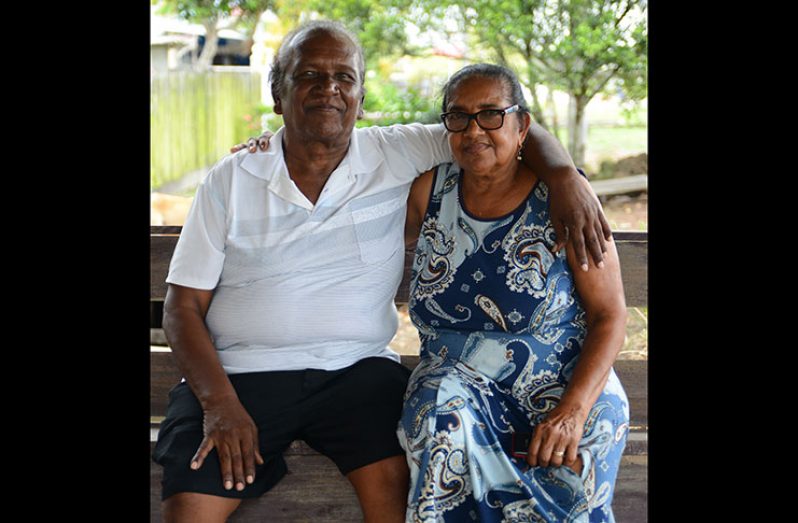By Shirley Thomas
ATMARAN Ramotar, also called Pandit Ramotar, of La Venture, Canal Number One, West Bank Demerara, celebrated his 72nd birthday at his home last Tuesday; he spent it sitting out in his yard with his treasured wife, Scavy, reminiscing on the good times they have spent together and the sacrifices they made in order to be living a comfortable life today.
Atmaran was born and grew up in Canal Number One with his parents, three sisters and three brothers in a closely bonded family environment.
Asked what would he do for the remainder of the birthday, he replied: “I’d relax. You see, we are not fancy. We grow very poor … very simple. My father used to work with people for a cent and a halfpenny a rod a day to weed the farm and that was years ago; and that was deep into the forest. We [my brothers and I] would go with him at a place called Yampari and we would help him weed.
“Then when time comes for payment, the shop man would give my father goods in exchange for labour [imposing a barter system.] He never get money to bring home, and so he had to do other things, like planting pine, but that too did not pay despite the hard work; and so my father took to working on the Leonora Sugar Estate.”
Boyhood days
Sharing memories of his childhood days, he said: “We grew up poor, very poor and I couldn’t afford shoes, so I went to school ‘barefoot’. The road was bare mud, especially in rainy season and so we had to walk through the mud, with it reaching above yuh ankle,” he recalled.

On average, Atmaran said, he walked seven miles to school in a place called ‘A’ Line, in the same Canal Number One; it was three and a half miles each way on foot. But in retrospect, he now considers it a labour of love, because they did it to get an education and that was the most important thing. “In fact, I was always the first to get to school. The school was McGillivray Primary School and it was run by a Canadian Mission in those days, he recalled.
“At that time we were living in a place called Leonora Backdam, then from there, we come down here at La Venture where I met the lady of my life. Her father gave us this land and we start with a little house and I start to work far away in the Yampari forest behind the Bonasika Conservancy. We planted pine, because it thrives well on sandy soil, but what I did getting for it couldn’t pay, plus sales was slow.
“I did farm work too — hard work. I cut cane and work at Yampari with my father, cutting cane at Leonora Estate. That is years gone by. My father died about 20 years back and mother about 15 years ago,” Atmaran stated.
However, he said, he worked and build himself. “You got to try you just can’t sit back, especially when you have a wife and children,” he said. And so soon after meeting Scavy, the two became married. The union brought forth one son and later on, a granddaughter. “[My son] is a tradesman: an electrician and a carpenter/ mason – a real Jack of all Trades,” he said.
Good begets good
Atmaran, who is a Hindu, said he eventually became a Pandit and a Hindi teacher and believes in the mantra that when you do good, good will follow you. He said he believes in showing people the way of life and how to become elevated. He believes that every action carries a reaction, stating confidently that, “The Bible says so too.”
Agreeing that La Venture has grown by leaps and bounds in terms of housing development since he first took up residence there, Atmaran alluded to the beautiful dream house he built after getting married. Asked what else would he desire to see happen to promote development in the village, he replied. “Not only the village, but mostly the economy. The economy has dropped a lot. For example, when you sell the pine you not getting a right price. We selling it for the labour cost. But I guess that is the economy of the world … not only Guyana. I would sit and look at it on television.
“I work so hard in my lifetime that even as I was still planting pine, I started to get weaker and weaker. I became sick with dengue fever and end up lying down whole day with fever. But I believe in God and God is the great healer,” he contended.
He also lamented the level of personal income tax, saying he would like to see it go down.
“If there is one more thing I would like to see the country do – reduce income tax. That is killing … terrible. And when it comes to that light bill, I used to pay $8,000 and now it has gone up to $20,000 a month for my residential facility,” he said.


.jpg)











